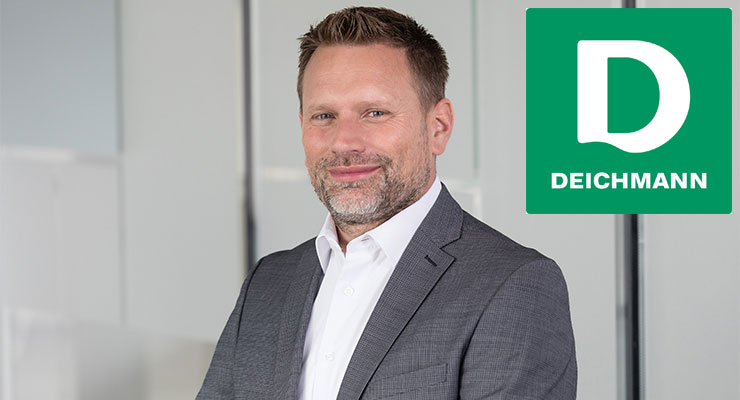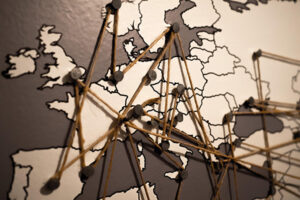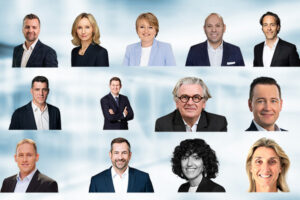ACROSS: What is your recipe for success? What makes Deichmann different from the others?#
Christian Hinkel: Our positioning is clear. It has also become clear, especially with respect to the DEICHMANN concept, that our core claim of offering the best value for money on the market is attractive to our customers, even or especially in times of crisis. We have also managed to attract additional groups of shoppers to our stationary stores and online stores due to our fashionable range and other well-known external brands, and to successfully offer higher-priced brand models. The majority of consumers have rewarded our courage.
ACROSS: Half of the planned investment in Germany will go toward modernizing the store network, specifically at new stores, and it will also be used in the areas of digitalization and logistics. Why?
Hinkel: In 2023, we will continue to focus on modernizing our store network, systematically expanding our brand portfolio, and further developing our successful omnichannel strategy.
We still strongly believe strongly in the stationary business. That is a strong pillar for us. We are investing in attractive stores that offer a unique shopping experience to our customers. In addition, as an omnichannel provider, our online store ensures that we have high digital relevance and visibility. Shopping at DEICHMANN should be easy, fast, and convenient for our customers – across all channels.
When a company grows, the supporting functions, such as logistics, must also evolve in order to be successful in retail. In addition to the stationary business, the e-commerce and omnichannel fields must also be taken into consideration. That is why DEICHMANN consistently invests in its logistics sector.
ACROSS: How important is online retailing for Deichmann? What recent developments have occurred in that sector? What are your plans for the future?
Hinkel: In 2000, DEICHMANN was the first shoe retailer to sell its products online. The coronavirus pandemic clearly showed us, an omnichannel provider, the importance of digitalization. A significant increase in e-commerce was seen during the pandemic. The most critical point for us is to consistently combine the elements of brick-and-mortar retail with those of the online store to make it as easy as possible for our customers to switch channels. For us, it is essential that the online area grows with us, earns money, and generates new customers, thereby making a significant contribution to our overall growth.
Examples of our omnichannel services include Click & Collect, which enables customers to pick up online orders at our stores, and our BITA app, which gives customers access to our entire inventory in-store. We want to expand our omnichannel product landscape in general, for example, with the rollout of SCAYLE, our new central omnichannel platform. It was initially launched in Slovakia and the Czech Republic, but it will also be used throughout the company. Our enhanced App 4.0 offers customers a faster shopping experience and new features.
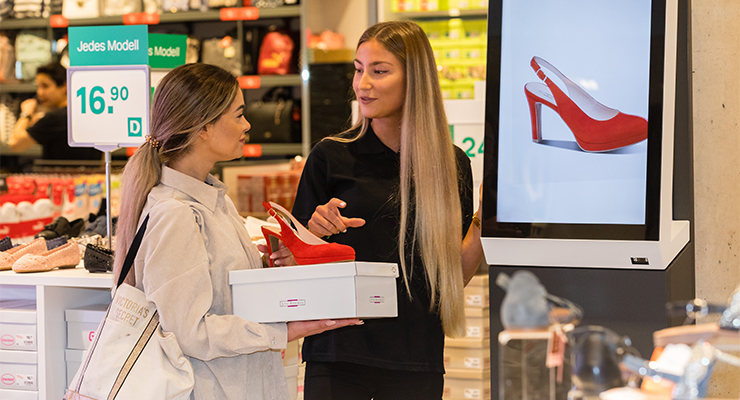
ACROSS: What changes in customer behavior have you noticed in the aftermath of the pandemic?
Hinkel: Customers were happy to return to the stores. Shopping is also about meeting people as well as touching and tasting goods – it’s about having meaningful experiences. Despite all the external crises, we had a good financial year in 2022. We didn’t have to close any stores as a result of the pandemic, nor did we have to lay off any employees. The positive development across all concepts is due to growth at our outlets and successful acquisitions, for example, in the USA. It is particularly pleasing that we have managed to achieve a strong level of growth at our existing outlets across the Group in the past year. We are truly grateful to our customers, who have always been happy to come to our stores to buy good shoes for themselves and their families at the best value for money. Such a thing was unforeseeable in this format.
ACROSS: Energy costs, inflation, logistics problems … to what extent has Deichmann been affected by those negative influences, and what are you doing about it?
Hinkel: At the moment, the situation in the fashion retail sector is tense and characterized by crises. The entire industry is facing very significant challenges. That makes investing with foresight and prudence all the more critical, which is why the company has always looked ahead – even during the coronavirus pandemic. At our company, we are not fearful or hesitant; we are determined and committed to successfully leaving the global crises behind us. DEICHMANN is setting the strategic course for the future with forward-looking investments. The investments are flowing into the modernization of the store network, the opening of new stores, the optimal linking of online and offline services, international expansion, further digitalization, and logistics.
ACROSS: How do you plan to improve the customer experience at your stores?
Hinkel: We want to continue to consistently improve the brand experience that DEICHMANN offers customers on-site. Shopping at DEICHMANN should be fun and easy across all channels. With that in mind, we are also continuing to invest in the existing store network: Around 450 stores across the Group are due to be remodeled in Europe over the year. The new store concept, which was developed in international cooperation and will gradually shape the store image throughout the Group, is leading the way in this respect. With a modern look, a generous sense of space, soft color worlds, and plenty of room for sporting goods, DEICHMANN is taking another step toward the future with its new store design.
Customer guidance through color accents, open ceilings, ceiling sails above defined areas, and modified furniture are just some of the features. One particular highlight is the spacious sports department for men and women, which includes an inviting sneaker wall with brands such as Adidas, Nike, Puma, FILA, Reebok, Asics, and Sketchers. New services, the expansion of the omnichannel offering, and the linking of brick-and-mortar stores and online retail also play an important role here. Examples include Click & Collect, which enables customers to pick up online orders in-store, and our BITA app, which gives customers access to our entire inventory in-store.
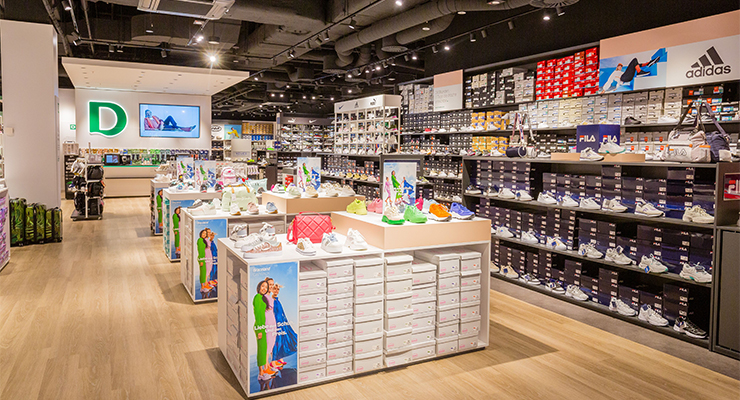
ACROSS: Regarding country expansion: What are you focused on? Are new market entries planned?
Hinkel: There are no concrete plans for new market entries in the Central and Southeastern Europe region, which currently comprises 10 countries and is centrally managed from Vienna. However, all options are constantly reviewed. The planned group-wide growth also includes stores operated by franchise partner AZADEA Group. Following successful market entry in Dubai in 2019, in Kuwait in 2020, and openings in Qatar and Oman in 2021/22, the expansion on the Arabian Peninsula continues. This year, for example, branches in Abu Dhabi and Saudi Arabia are on the agenda for the first time.
ACROSS: Are there any differences in buying behavior / consumer climate between Eastern and Western Europe?
Hinkel: The fashion tastes of our clientele differ somewhat from country to country, but they are not too different from those in the rest of Europe. The acceptance of our assortment is very high. Our range is aimed at all age groups; the whole family will be able to find what they are looking for. To a large extent, the product range is the same as it is in other countries. However, we also take the local markets into consideration and develop up to 10 percent of our product range specifically for our customers in each respective country. Of course, depending on the economic situation of a given country, differences in the consumer climate can be found. Customers can rely on a wide range of DEICHMANN products and quality across borders. There are also country-specific offers.
ACROSS: Deichmann has a solid presence in the sneaker market. What additional plans do you have for that segment? What markets will follow Poland and Croatia?
Hinkel: The sneaker segment has been integral to the DEICHMANN range for several decades, and demand is naturally huge. That’s why we are also intensifying our strategic cooperation with global sports brands, for example. Due to fashion’s general “casualization”, we are seeing a sustained increase in demand for sporty styles overall. We continue to see demand for our brands as well as sports brands such as Nike, Adidas, PUMA, Fila, Sketchers, and Asics.
Therefore, we are in a continuous state of development with respect to the sports shoe theme. That applies to our stationary stores as well as to our online store. Strategic cooperation with sports brands has significantly intensified to make every budget’s active lifestyle possible. At the same time, DEICHMANN has made the latest lifestyle trends offered by sports brands accessible to everyone. The importance of the sports segment is also reflected in our current store design concept. Premium sports brands are staged in a new look and feel, thereby creating a new shopping experience. In the areas in which we are limited by price in the DEICHMANN concept, we have a vast selection in the SNIPES group.
ACROSS: Deichmann SE is wholly owned by the Deichmann family. Is that part of the success of the concept? If so, why?
Hinkel: As a company, we continue to stand for continuity and reliability. Even today, after 110 years, DEICHMANN SE is still a purely family-owned company that has retained its independence from external financiers. As a family business, we think in generations rather than in quarters. “The company must serve people” – customers, employees, partners, and people in need. That conviction has prevailed within the Deichmann family from the very beginning. Against that backdrop, profits are important to enable healthy corporate growth and to create jobs. At the same time, however, a portion of the profits has also been invested in social commitment for a number of years.
ACROSS: Let’s talk about retail areas. Will your stores be larger or smaller in the future? What is your strategy regarding store size?
Hinkel: The size of our stores depends on the achievable sales potential – we are usually satisfied with a total area of approximately 500-600 sq m. Offering the customer an optimal shopping experience and a competent assortment at each of our stores is important to us. A vital parameter is good area productivity, rather than generating additional sales through pure area growth.
ACROSS: When it comes to location types – city centers, specialist stores, shopping centers – which types do you focus on, and why?
Hinkel: In this regard, as is so often the case, it comes down to a good mix. That is our strength. One of our focal points is the specialty store sector, which has developed dynamically in recent years. During the coronavirus pandemic, in particular, there were, in some cases, very positive customer footfall and sales effects, which are also sustainable in character in many instances. In the case of shopping centers, development has been quite different. Even though footfall figures have returned to pre-coronavirus levels in some cases, that is only sometimes the case when it come to sales. The same is true for most downtown locations. However, as costs, especially leases, continue to rise due to inflation, we are constantly evaluating the profitability of locations. At some locations, the sales and footfall are no longer in line with the costs, making it necessary to close or relocate stores.
ACROSS: Regarding the labor market: Have you encountered any problems attracting or retaining good employees? Are there any country-specific differences? If so, what are they?
Hinkel: We owe much of our success to our dedicated employees. We invest a great deal in training our staff, we have developed a program to promote young talent, and we offer good career opportunities. Having a solid basis is essential. DEICHMANN embodies many qualities that have successfully brought the international group of companies through global crises to date: a solid economic foundation, flexibility, creativity, foresight, and, above all, a committed team that stands by the company and masters problematic tasks together. However, in some countries, we have also noticed that the coronavirus crisis has resulted in a shortage of skilled workers in the retail sector. In general, HR work is more demanding during times of crisis and poses particular recruitment challenges. We have increased our recruiting activities and are striving to reach our target groups in an even better way.
ACROSS: What consumer trends have you seen? What impact do they have on your future site selection and store design?
Hinkel: As an omnichannel provider, we know that today’s shoppers contact the retailers of their choice via a wide variety of channels. Our points of contact with consumers are, therefore, open to more than brick-and-mortar or online alone. The critical issue for us is to consistently combine the elements of brick-and-mortar retail with those of the online store to make it as easy as possible for our customers to switch channels.
With a well-thought-out marketing mix, we can efficiently reach people using innovative measures along the customer journey and thus accompany them in their purchasing decision-making process.
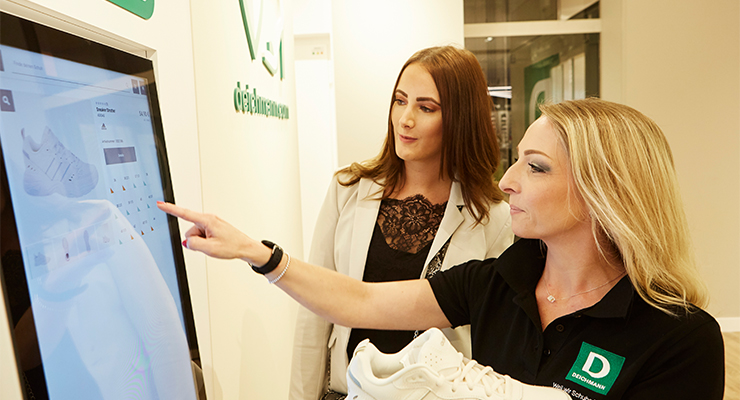
ACROSS: What role do digital strategies play in that regard?
Hinkel: Powerful digitalization of stationary retail can help to link offline with online, thereby making it easier for customers who like going to stores to find products and services – as early as the planning stage of their visits. Examples include services such as Click & Collect, which enables customers to pick up online orders in-store, and our BITA app, which gives customers access to our entire inventory in-store. To that end, we have also continued to systematically invest in the attractiveness of our stores.
ACROSS: What does that mean?
Hinkel: A modern store must meet its customers’ functional and emotional requirements. Approximately 450 stores throughout the Group will, therefore, be refurbished over the year – in line with the current state of affairs in Europe. Our new store concept is leading the way. A modern look, open ceilings, a spacious feel, soft color schemes, and plenty of space for sporting goods. New services, the expansion of our omnichannel offering, and the linking of brick-and-mortar stores and online retail also play essential roles in that regard. One of our focal points is the specialty store sector, which has developed dynamically in recent years.
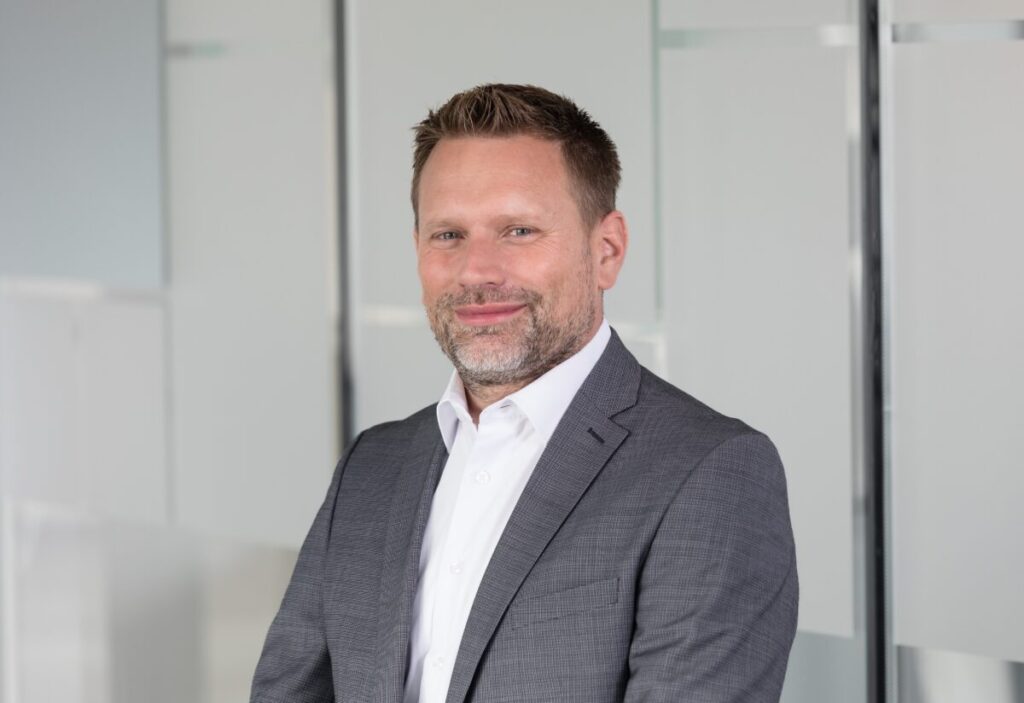
Christian Hinkel
Christian Hinkel is Head of Corporate Communications at Deichmann

